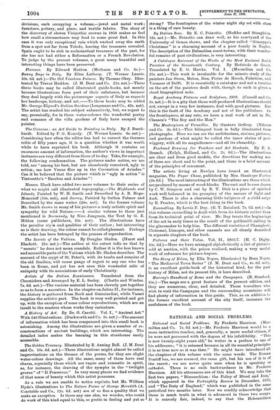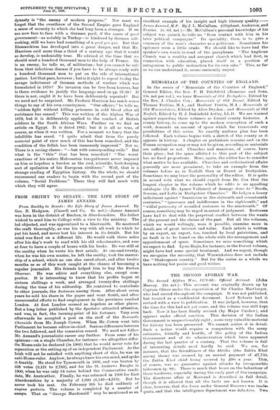NATIONAL AND SOCIAL PROBLEMS.
National and Social Problems. By Frederic Harrison. (Mac- millan and Co. 7s. 6d. net.)-Mr. Frederic Harrison would be a more instructive teacher, and, generally, a more useful citizen, if he were not possessed with the dogma of his infallibility. "This is now twenty-eight years old," he writes in a preface to one of his addresses ; "it is reissued because in all its essential principles it is as true now as it was then." He might have introduced all the chapters of this volume with the same words. The Roman Pontiff has, we are assured, the same gift, but his use of it is of the rarest ; we are never quite sure when he is speaking ex cathedrft. There is no each backwardness in Mr. Frederic Harrison. All his utterances are of this kind. We may take the first two papers, " Bismarckism : the Policy of Blood and Iron," which appeared in the Fortnightly Review in December, 1870, and "The Duty of England," which was published in the same periodical two months later. Now we readily acknowledge that there is much truth in what is advanced in these two essays. It is scarcely fair, indeed, to say that the Hohenzollern dynasty is "the enemy of modern progress." Nor must we forget that the overthrow of the Second Empire gave England a sense of security to which she had long been a stranger. If we are now face to face with a German peril, if the cause of good government—as notably in Turkey—is hindered by German self- seeking, still we have had something of a quid pro quo. But that Bismarekism has developed into a great danger, and that Mr. Harrison said more than a third of a century ago that it would so develop, is undeniably true. He advised at the time that we should send a hundred thousand men to the help of France. He is an enemy, he tells us, of militarism ; but you cannot be safe from that infectious disease if you have to be always ready with a hundred thousand men to put on the side of international justice. Let that pass, however ; but is it right to repeat to-day the savage indictment of German methods of warfare which was formulated in 1870 ? No invasion can be free from horrors, but is there evidence to justify the language used on pp. 37-38? If there is not, ought it to have been deliberately repeated ? But we need not be surprised. Mr. Frederic Harrison has much worse things to say of his own countrymen. "Our officers," he tells us, "seldom fight without killing prisoners in cold blood after all resistance has ceased." This was written of the Afghan War of 1879, but it is deliberately applied to the conduct of British soldiers in the South African Wars. Further on we find an article on Egypt. It is dated 1882; but it is all as true, of course, as when it was written. For a moment we fancy that the infallible has erred. "I quite admit that from the purely material point of view much of this has been remedied, and the condition of the fellah has been immensely improved." Not so. There is a saving clause : "—but with corresponding evils." But what is the " this " that has been remedied ? "The worst exactions of his native Mahometan tax-gatherers never imposed on him so hopeless a burden as the cool, scientific, book-keeping sort of spoliation of his European eivilizers." Well, that is a strange reading of Egyptian history. On the whole, we should recommend our readers to begin with the second part of the volume, "Social Problems." There they will find much with which they will agree.























































 Previous page
Previous page